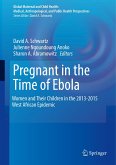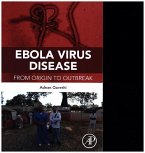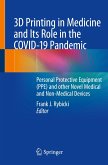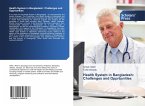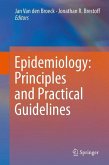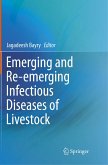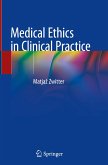Principles and Practice of Emergency Research Response
Herausgegeben:Higgs, Elizabeth S.; Sorenson, Robert A.; Fallah, Mosoka P.; Lurie, Nicole; McNay, Laura A.; Smith, Peter G.
Principles and Practice of Emergency Research Response
Herausgegeben:Higgs, Elizabeth S.; Sorenson, Robert A.; Fallah, Mosoka P.; Lurie, Nicole; McNay, Laura A.; Smith, Peter G.
- Gebundenes Buch
- Merkliste
- Auf die Merkliste
- Bewerten Bewerten
- Teilen
- Produkt teilen
- Produkterinnerung
- Produkterinnerung
Unlocking the Future of Infectious Disease Research ResponseIn a world where emerging infectious diseases constantly threaten humanity, advances in science and technology promise defense against future pathogens before they cause pandemics. The field of emergency research response and preparedness remains in its infancy, however. Not until the 2014 West African Ebola outbreak was accelerated research broadly recognized as a crucial component of emergency response. Many outbreaks and one global pandemic later, it is clear the world must be prepared to launch accelerated research responses to…mehr
Andere Kunden interessierten sich auch für
![Pregnant in the Time of Ebola Pregnant in the Time of Ebola]() Pregnant in the Time of Ebola109,99 €
Pregnant in the Time of Ebola109,99 €![Ebola Virus Disease Ebola Virus Disease]() Adnan I. QureshiEbola Virus Disease78,99 €
Adnan I. QureshiEbola Virus Disease78,99 €![3D Printing in Medicine and Its Role in the COVID-19 Pandemic 3D Printing in Medicine and Its Role in the COVID-19 Pandemic]() 3D Printing in Medicine and Its Role in the COVID-19 Pandemic59,99 €
3D Printing in Medicine and Its Role in the COVID-19 Pandemic59,99 €![Health System in Bangladesh: Challenges and Opprtunities Health System in Bangladesh: Challenges and Opprtunities]() Anwar IslamHealth System in Bangladesh: Challenges and Opprtunities31,99 €
Anwar IslamHealth System in Bangladesh: Challenges and Opprtunities31,99 €![Epidemiology: Principles and Practical Guidelines Epidemiology: Principles and Practical Guidelines]() Epidemiology: Principles and Practical Guidelines155,99 €
Epidemiology: Principles and Practical Guidelines155,99 €![Emerging and Re-emerging Infectious Diseases of Livestock Emerging and Re-emerging Infectious Diseases of Livestock]() Emerging and Re-emerging Infectious Diseases of Livestock123,99 €
Emerging and Re-emerging Infectious Diseases of Livestock123,99 €![Medical Ethics in Clinical Practice Medical Ethics in Clinical Practice]() Matjaz ZwitterMedical Ethics in Clinical Practice66,99 €
Matjaz ZwitterMedical Ethics in Clinical Practice66,99 €-
-
-
Unlocking the Future of Infectious Disease Research ResponseIn a world where emerging infectious diseases constantly threaten humanity, advances in science and technology promise defense against future pathogens before they cause pandemics. The field of emergency research response and preparedness remains in its infancy, however. Not until the 2014 West African Ebola outbreak was accelerated research broadly recognized as a crucial component of emergency response. Many outbreaks and one global pandemic later, it is clear the world must be prepared to launch accelerated research responses to prevent or mitigate infectious disease outbreaks, epidemics, and pandemics. Yet this nascent field is rife with critical scientific, ethical, and policy questions. How can local, national, and global systems collaborate across disciplines and political boundaries to protect health security? How can we conduct rigorous research in fragile or failed nation-states? What is needed for equitable distribution of vaccines and therapeutic medicines in short supply? How can we accelerate trials of vaccines and therapeutics during an emergency without compromising scientific rigor or ethical standards? How do we integrate communities and stakeholders into research preparedness and response? The editors bring decades of experience to their collaboration with renowned research scientists and health policy experts. Together they have crafted a compendium that proposes normative standards and offers practical guidance for preparedness and rapid research response. This pioneering, open access textbook presents principles and practices forged from experience in health emergencies - insights that illuminate a path forward for research response and preparedness. The goal is to stop outbreaks from becoming avoidable pandemics, and to mitigate illness, death, and social disruption if they cannot be stopped. Principles and Practice of Emergency Research Response merges historical understanding with insights into possible futures. It will serve as an indispensable compass for curtailing infectious disease threats through research, global health policy changes, and research capacity improvements where they are most needed. The editors hope that this book will be an ongoing reference for governments, health organizations, development agencies, researchers, policy experts, ethicists, and social scientists. To facilitate focused and enhanced learning, it incorporates pedagogical tools such as abstracts, learning objectives, discussion questions, real-life examples, and learning tracks. Robust global health security requires effective preparation for and response to emerging and re-emerging pathogens. This volume should help guide us towards a more resilient future.
Hinweis: Dieser Artikel kann nur an eine deutsche Lieferadresse ausgeliefert werden.
Hinweis: Dieser Artikel kann nur an eine deutsche Lieferadresse ausgeliefert werden.
Produktdetails
- Produktdetails
- Verlag: National Institute of Allergy and Infectious Diseases / Springer / Springer International Publishing
- Artikelnr. des Verlages: 978-3-031-48407-0
- 2024
- Seitenzahl: 1164
- Erscheinungstermin: 1. September 2024
- Englisch
- Abmessung: 260mm x 183mm x 51mm
- Gewicht: 2593g
- ISBN-13: 9783031484070
- ISBN-10: 303148407X
- Artikelnr.: 69134552
- Herstellerkennzeichnung Die Herstellerinformationen sind derzeit nicht verfügbar.
- Verlag: National Institute of Allergy and Infectious Diseases / Springer / Springer International Publishing
- Artikelnr. des Verlages: 978-3-031-48407-0
- 2024
- Seitenzahl: 1164
- Erscheinungstermin: 1. September 2024
- Englisch
- Abmessung: 260mm x 183mm x 51mm
- Gewicht: 2593g
- ISBN-13: 9783031484070
- ISBN-10: 303148407X
- Artikelnr.: 69134552
- Herstellerkennzeichnung Die Herstellerinformationen sind derzeit nicht verfügbar.
Dr. Elizabeth S. Higgs, MD, MIA, DTMH, is a global health science advisor, clinical scientist, and pandemic preparedness research response policy expert working in the Division of Clinical Research at the U.S. National Institute of Allergy and Infectious Diseases (NIAID), National Institutes of Health (NIH). Throughout her career, Dr. Higgs has contributed to critical health emergencies, including H1N1, Ebola outbreaks in West Africa and the DRC, the 2018 Nipah outbreak in Kerala, India, mpox, and SARS-CoV-2, demonstrating that regulatory-level clinical trials during health emergencies are possible and contribute to medical countermeasures that accelerate the end of outbreaks. Known for global health diplomacy while fostering interagency and multilateral collaborations, she actively engages in strategic global health security initiatives and policy groups, making impactful contributions to key policy documents such as the World Bank's Money and Microbes, the G7 Clinical Trials Charter, and the U.S. National Biosecurity Strategy and Global Health Security Strategy. Her passions include nurturing sustainable clinical research capacity in low- and middle-income countries and promoting cooperative global clinical trial networks. With a foundation in internal medicine and infectious diseases, Dr. Higgs holds a doctorate in medicine, a master's degree in international affairs, an interdisciplinary bachelor's degree in bioethics, and a Diploma in Tropical Medicine and Hygiene. Through her commitment to response research, she is dedicated to safeguarding and enhancing the well-being of people worldwide in the face of health emergencies caused by emerging infectious disease. Robert A. Sorenson has worked with the NIAID Division of Clinical Research on infectious disease emergency response policy, especially urgent clinical research response to emerging pathogens, since 2016, after having worked on global health policy issues at the U.S. Department of State since 2009. Mr. Sorenson was a Foreign and Civil Service Officer at State for 33 years. After 2001, when family circumstances curtailed his overseas career, he primarily served in the Bureau of Oceans, Environment, and Science, including terms as Deputy Director of the Offices of International Health and Biodefense, Environmental Policy, and Ecology and Terrestrial Conservation. His overseas experience, starting in 1986, included political, consular, environmental, and deputy chief of mission positions in Manila, Moscow, Osaka, Skopje, Tashkent, and Tirana, as well as several temporary duty assignments in crisis spots. He retired from State on New Year's Eve, 2017 and has since been a contractor with NIAID. As managing editor of PPERR, Mr. Sorenson revived and updated his professional editorial experience, which dated to 1981-1986. He wasa National Fellow at the Hoover Institution in 1999-2000 and has an MA in Russian literature from Cornell University and a BA from St. Olaf College Nicole Lurie, M.D., M.S.P.H., is Executive Director for Preparedness and Response at the Coalition for Epidemic Preparedness Innovations (CEPI) and Director of CEPI-US. She is also a Senior Lecturer at Harvard Medical School and Professor of Medicine at George Washington University School of Medicine. She served an eight-year term as Assistant Secretary for Preparedness and Response at the U.S. Department of Health and Human Services from 2009 to 2017. In that role she led the HHS response to numerous public health emergencies, ranging from infectious disease to natural and man-made disasters, and is responsible for many innovations in emergency preparedness and response. Prior to federal service, she was the Paul O'Neill Professorof Policy Analysis at RAND, and a Professor of Medicine and Public Health at the University of Minnesota. Her research has spanned access to and quality of care, health system redesign, health equity, mental health, public health, and preparedness. She is the recipient of numerous awards and is a member of the National Academy of Medicine. She continues to practice medicine in a community clinic in Washington DC. Peter Smith is Professor of Tropical Epidemiology at the London School of Hygiene &Tropical Medicine (LSHTM). He graduated in mathematics and statistics from City University, London and in 1965 joined the Medical Research Council's Statistical Research Unit in London. Since then, he has worked on various aspects of epidemiological and statistical research based in Edinburgh, Kampala, Oxford, Boston and Geneva. He joined LSHTM in 1979 to head the MRC International Statistics & Epidemiology Group. Research interestsinclude large-scale intervention studies against tropical diseases, recently focussing on vaccines. From 1999 to 2004 Dr. Smith chaired the UK Government Spongiform Encephalopathy Advisory Committee. He has chaired the WHO Global Advisory Committee on Vaccine Safety and the WHO Technical Expert Group on the RTS,S/AS01 malaria vaccine. He served as the Deputy Chair of the Nuffield Council on Bioethics and from 2004 to 2014 was a Governor of the Wellcome Trust. He has served on the Scientific Advisory Committees of the Coalition for Epidemic Preparedness Innovations (CEPI) and the European and Developing Countries Clinical Trials Partnership (EDCTP). He chairs the WHO SAGE Working Group on malaria vaccines and serves on the WHO SAGE Working Group on SARS-CoV-2 vaccines. Laura Ann McNay, MS, is the Deputy Director for Operations and Management in the Division of Clinical Research, NIAID. She started her career at NIAID in 1991 and has served in many roles at NIAID over the past 32 years. During Ms. McNay's tenure with DCR, she has been responsible for the management and oversight of numerous small and large, multinational clinical trials. In addition to her role as DCR Deputy Director for Operations and Management, she serves as the DCR Project Lead for the Partnership for Research on Vaccines and Infectious Diseases in Liberia (PREVAIL). PREVAIL is a clinical research partnership between the U.S. Department of Health and Human Services (DHHS) and the Liberian Ministry of Health. Ms. McNay attended the University of Maryland Baltimore County where she received her bachelor's degree in economics in 1987. In 2002, she received her Master of Science in Management and Healthcare Administration. Mosoka P. Fallah, PhD, MPH, MA is Program Manager of the Saving Lives and LivelihoodsInitiative, Africa Centres for Disease Control and Prevention. The Initiative supports the acquisition and distribution of 65 million COVID-19 vaccine doses and has a mandate to focus on turning vaccine deliveries into vaccinations. Dr. Fallah completed his PhD in Immunology at the University of Kentucky and his MPH in Global Health/Infectious Disease Epidemiology at the Harvard T. H. Chan School of Public Health. For his work building community-level trust in the Ebola response, Dr. Fallah was named one of the Time Magazine Persons of the Year in 2014. Dr. Fallah was also the co-founder and Director General of the National Public Health Institute of Liberia (NPHIL), which was founded in response to the devastation of the 2014-2016 Ebola outbreak in Liberia. He has also held positions as a health security technical consultant on pandemic diagnostics with the World Bank, visiting lecturer at Harvard Medical School, and senior consulting scientist atMedical Science & Computing, LLC. He continues to serve as President and CEO of Refuge Place International (RPI), a non-governmental organization dedicated to creating a replicable health care model for economically poor and disenfranchised people residing in the urban slums and poor rural communities of Liberia.
Section I. Pandemic Preparedness and Research Response: A Necessary New Field.- 1. Introduction.- 2. Clinical Research on Infectious Diseases.- 3. Guiding Principles for Emergency Research Response.- Section II. Norms for Emergency Research Response.- 4. Ethics of Pandemic Research.- 4.1. In Practice: Vaccine Efficacy and Safety Testing - An Ethical Case for Individual Randomization.- 4.2. In Practice: Research Ethics Committee Review in Public Health Emergencies.- 5. Health Emergency Research amid Global Inequities.- 6. Meeting Regulatory Criteria and Seeking Licensure.- 7. Research, Sample, and Data Sharing During Outbreaks, Pandemics, and Beyond.- Section III. Preparedness for Emergency Research Response.- 8. Building Biomedical Research Capacity in Low- and Middle-Income Countries.- 9. Laboratory Needs for Research Response.- 10. Understanding How and Where Pathogens Emerge.- 11. Accelerating Diagnostic Innovation for Pandemic Control.- 12. Vaccine Candidates for Novel Pathogens.-12.1. In Focus: Novel Manufacturing Platforms for Pandemic Preparedness and Emergency Response.- 13. Accelerating Vaccine Development.- 14. Accelerating Development of Therapeutics for Preparedness, Response, and a More Secure World.- 14.1. In Practice: The RECOVERY Trial.- Section IV. Research Response.- 15. ACTIV: A U.S. Public-Private Partnership Responds to COVID-19.- 15.1. In Practice: Leveraging an Integrated National Health System for Research Response.- 16. Challenges for Emergency Research Interventions in Fragile, Weak, and Failed Nation States.- 16.1. In Practice: Responding to an Infectious Disease Outbreak amid a Humanitarian Emergency.- 17. Integrating Clinical Research into Ebola Response: Liberia Case Study.- 17.1. In Practice: Integration of Clinical Research and Patient Care in the DRC PALM Ebola Therapeutics Trial.- 18. Good Participatory Practice. Social Mobilization, Communications, and Community Engagement.- 18.1. In Practice: Building Community Engagement for Clinical Research Response.- 18.2. In Practice: Adapting Social Analytics for Research Response.- 19. Understanding and Reporting the Natural History of an Infectious Disease.- 20. Turning Research Results into Clinical Practice Guidelines in Public Health Emergencies.- Section V. Methodology for Research Response.- 21. Epidemiological Research in the Setting of Outbreak Response.- 21.1. In Focus: The Impact and Mechanisms of Superspreading.- 22. Vaccine Trial Designs.- 22.1. In Focus: Ring Trial Design.- 23. Data and Safety Monitoring of Clinical Trials During Public Health Emergencies.- 23.1. In Practice: Monitoring the PALM Ebola Therapeutics Study in the Democratic Republic of the Congo.- 24. Mathematical Modeling for Emergency Response.- 25. Models in the COVID-19 Pandemic.- 25.1. Case Study: Modeling Fractional-Dose Emergency Vaccination Campaigns for Yellow Fever.- 26. Social Science Evidence for Outbreak and Pandemic Response.- Section VI. Governance, Institutions, and Partnerships.- 27. A Global Framework for Research Preparedness and Response.- 28. Financing Emergency Research Response during Infectious Disease Outbreaks.- 29. International Collaboration to Advance Research Preparedness and Response.- 30. Organizational Partnerships for Preparedness and Response to Emerging and Re-Emerging Infectious Diseases.- 30.1. In Focus: Research and Medical Humanitarian NGOs.- 30.2. In Practice: Building and Maintaining Preparedness for a Rapid Research Response in Indonesia.- Section VII. Research Operations.- 31. Operational Recommendations for Streamlining Emergency Research Responses to Pandemics.- 32. Launching a Clinical Research Operation.- 32.1. In Practice: Clinical Research Communications During an Outbreak.- 32.2. In Focus: Clinical Trial Insurance and Indemnification.- 33. Ethical Review of Research During an Emergency Response.- 33.1. In Practice: Ethical Review During Emergencies - The Liberian Experience.- 33.2. In Practice: Independent Monitoring of Emergency Response Clinical Trials.- 33.3. In Practice: Capacity Building for Research Ethics Review in Low- and Middle-Income Countries.- 34. Information and Communications Technology to Support Research Low-Resource Settings.- 35. Data Management in Emergency Response Research.- 36. Safety and Pharmacovigilance in Emergency Research Response.- 37. Supply and Logistics for Clinical Research in Low-Resource Settings.- 38. Pharmaceutical Management.- 39. Cold Chain and Electrical Power for Emergency Research Response.- 40. Selecting and Opening a Clinical Research Site in a Low-Resource Setting.- 40.1. In Practice: Improving Patient Care in the Field - The CUBE Isolation Unit.- 41. Management of Security for Clinical Trials During Emergencies.- 42. Locally Hired Staff for Clinical Research Sites in Low-Resource Settings.
Section I. Pandemic Preparedness and Research Response: A Necessary New Field.- 1. Introduction.- 2. Clinical Research on Infectious Diseases.- 3. Guiding Principles for Emergency Research Response.- Section II. Norms for Emergency Research Response.- 4. Ethics of Pandemic Research.- 4.1. In Practice: Vaccine Efficacy and Safety Testing - An Ethical Case for Individual Randomization.- 4.2. In Practice: Research Ethics Committee Review in Public Health Emergencies.- 5. Health Emergency Research amid Global Inequities.- 6. Meeting Regulatory Criteria and Seeking Licensure.- 7. Research, Sample, and Data Sharing During Outbreaks, Pandemics, and Beyond.- Section III. Preparedness for Emergency Research Response.- 8. Building Biomedical Research Capacity in Low- and Middle-Income Countries.- 9. Laboratory Needs for Research Response.- 10. Understanding How and Where Pathogens Emerge.- 11. Accelerating Diagnostic Innovation for Pandemic Control.- 12. Vaccine Candidates for Novel Pathogens.-12.1. In Focus: Novel Manufacturing Platforms for Pandemic Preparedness and Emergency Response.- 13. Accelerating Vaccine Development.- 14. Accelerating Development of Therapeutics for Preparedness, Response, and a More Secure World.- 14.1. In Practice: The RECOVERY Trial.- Section IV. Research Response.- 15. ACTIV: A U.S. Public-Private Partnership Responds to COVID-19.- 15.1. In Practice: Leveraging an Integrated National Health System for Research Response.- 16. Challenges for Emergency Research Interventions in Fragile, Weak, and Failed Nation States.- 16.1. In Practice: Responding to an Infectious Disease Outbreak amid a Humanitarian Emergency.- 17. Integrating Clinical Research into Ebola Response: Liberia Case Study.- 17.1. In Practice: Integration of Clinical Research and Patient Care in the DRC PALM Ebola Therapeutics Trial.- 18. Good Participatory Practice. Social Mobilization, Communications, and Community Engagement.- 18.1. In Practice: Building Community Engagement for Clinical Research Response.- 18.2. In Practice: Adapting Social Analytics for Research Response.- 19. Understanding and Reporting the Natural History of an Infectious Disease.- 20. Turning Research Results into Clinical Practice Guidelines in Public Health Emergencies.- Section V. Methodology for Research Response.- 21. Epidemiological Research in the Setting of Outbreak Response.- 21.1. In Focus: The Impact and Mechanisms of Superspreading.- 22. Vaccine Trial Designs.- 22.1. In Focus: Ring Trial Design.- 23. Data and Safety Monitoring of Clinical Trials During Public Health Emergencies.- 23.1. In Practice: Monitoring the PALM Ebola Therapeutics Study in the Democratic Republic of the Congo.- 24. Mathematical Modeling for Emergency Response.- 25. Models in the COVID-19 Pandemic.- 25.1. Case Study: Modeling Fractional-Dose Emergency Vaccination Campaigns for Yellow Fever.- 26. Social Science Evidence for Outbreak and Pandemic Response.- Section VI. Governance, Institutions, and Partnerships.- 27. A Global Framework for Research Preparedness and Response.- 28. Financing Emergency Research Response during Infectious Disease Outbreaks.- 29. International Collaboration to Advance Research Preparedness and Response.- 30. Organizational Partnerships for Preparedness and Response to Emerging and Re-Emerging Infectious Diseases.- 30.1. In Focus: Research and Medical Humanitarian NGOs.- 30.2. In Practice: Building and Maintaining Preparedness for a Rapid Research Response in Indonesia.- Section VII. Research Operations.- 31. Operational Recommendations for Streamlining Emergency Research Responses to Pandemics.- 32. Launching a Clinical Research Operation.- 32.1. In Practice: Clinical Research Communications During an Outbreak.- 32.2. In Focus: Clinical Trial Insurance and Indemnification.- 33. Ethical Review of Research During an Emergency Response.- 33.1. In Practice: Ethical Review During Emergencies - The Liberian Experience.- 33.2. In Practice: Independent Monitoring of Emergency Response Clinical Trials.- 33.3. In Practice: Capacity Building for Research Ethics Review in Low- and Middle-Income Countries.- 34. Information and Communications Technology to Support Research Low-Resource Settings.- 35. Data Management in Emergency Response Research.- 36. Safety and Pharmacovigilance in Emergency Research Response.- 37. Supply and Logistics for Clinical Research in Low-Resource Settings.- 38. Pharmaceutical Management.- 39. Cold Chain and Electrical Power for Emergency Research Response.- 40. Selecting and Opening a Clinical Research Site in a Low-Resource Setting.- 40.1. In Practice: Improving Patient Care in the Field - The CUBE Isolation Unit.- 41. Management of Security for Clinical Trials During Emergencies.- 42. Locally Hired Staff for Clinical Research Sites in Low-Resource Settings.


